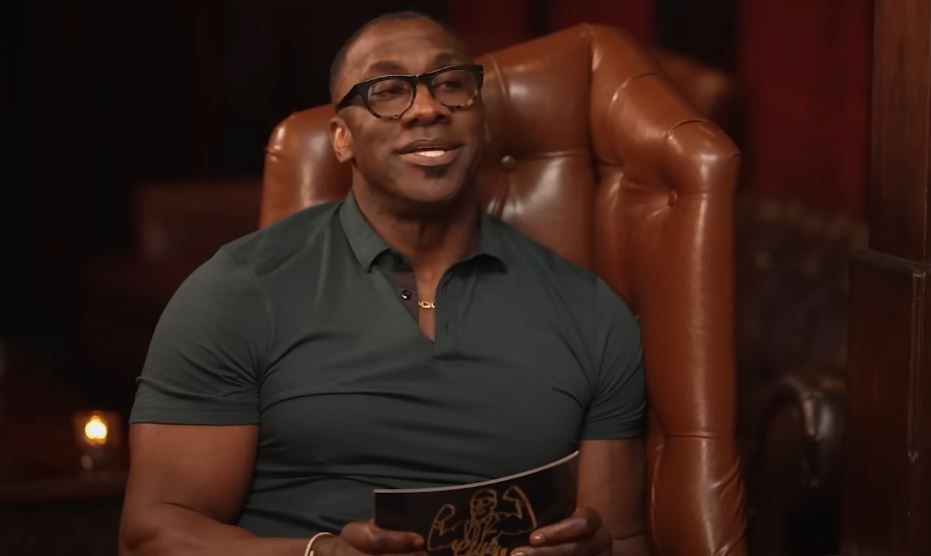The story of NFL legend Shannon Sharpe has changed significantly over the last few months, going from football legend to legal quagmire. Previously admired for his passionate analysis and commanding presence on ESPN’s First Take, Sharpe is currently dealing with a number of lawsuits, including a particularly contentious conflict involving his ex-girlfriend Michele Bundy Evans. Through court documents and public interviews, what once seemed to be a steady, ten-year relationship has devolved into something much darker—and unsettlingly complicated.
Evans has surfaced with accusations in recent days that go beyond personal strife. She filed a defamation lawsuit against Sharpe in 2023, alleging that he publicly defamed her while trying to hide the trauma she claims to have experienced during their 2010 breakup. Although the details are undoubtedly graphic, she claims that her goal is visibility rather than retribution. Evans reaffirms her right to speak up after fear, coercion, and celebrity intimidation silenced her voice in the past by sharing her version of events.
Shannon Sharpe & Michele Evans — Profile Overview
| Category | Details |
|---|---|
| Name | Shannon Sharpe |
| Date of Birth | June 26, 1968 |
| Age (as of 2025) | 56 years |
| Career | Former NFL Tight End (Denver Broncos, Baltimore Ravens), Sports Media Host, Commentator, Podcast Host (Club Shay Shay) |
| Ex-Girlfriend | Michele Bundy Evans |
| Relationship Timeline | Circa 2000–2010 |
| Legal History | Sued in 2023 for defamation by Evans; currently facing a separate $50 million lawsuit filed in 2025 by another woman |
| Public Role | Lead Analyst on ESPN’s First Take, Public Speaker, Cultural Commentator |
| Accolades | 3× Super Bowl Champion, Pro Football Hall of Fame Inductee (2011) |
| Official Source | New York Times – Shannon Sharpe Lawsuit Coverage |
The Lawsuit: Allegations of Betrayal, Fear, and Control
Evans asserts that during their tumultuous split, Sharpe’s alleged coercive actions led to a horrific sexual assault, which she says happened when she attempted to break up with him. Evans describes the encounter in court documents, claiming that she was violated and violently restrained before receiving terrifying threats to ruin her reputation if she ever went public. Her emotionally charged remarks provide insight into a very personal trauma that is currently being examined nationally.
Sharpe is charged with creating a narrative that delegitimized her experience by using his media influence. The main focus of Evans’ defamation lawsuit is Sharpe’s televised remarks, which she claims purposefully portrayed her as unstable, dishonest, and malevolent, sparking waves of online harassment that, in her opinion, have continued to this day.
🎙️ Celebrity Platforms: Instruments of Retaliation or Empowerment?
In the highly interconnected media landscape of today, influence moves remarkably quickly. Things that once took months to reach audiences now happen in a matter of seconds. This influence has been especially helpful to Sharpe’s career, as his booming voice and witty wit have garnered him a devoted following. However, as Evans claims, it can also be harmful when used improperly. Her legal team contends that Sharpe’s public naming and character criticism unleashed a digital mob that has significantly affected her safety and quality of life.
The way politicians or tech tycoons may influence public opinion—not in courtrooms, but through carefully crafted narratives and platform power—is remarkably similar to this situation. Public figures can either humanize themselves or use their image as a weapon by combining emotive rhetoric with selective facts. According to Evans, Sharpe allegedly did both.
💣 A Trend Shows Up: The Jane Doe Association
If a second lawsuit from a woman known only as Jane Doe hadn’t arrived in April 2025, the Evans lawsuit might have remained a closed chapter. Her claims are similar to Evans’s: a tumultuous, mutually agreeable relationship that allegedly descended into violence, emotional manipulation, and danger. Public discussion and legal complexity have only increased as a result of released audio clips that purport to show Sharpe threatening the woman.
According to Sharpe’s legal team, both of the relationships—which involved role-playing and adult fantasies—were completely voluntary. To support their claims, they have made statements, text exchanges, and screenshots public. However, such accusations carry a lot of weight in the court of public opinion, where memories are fleeting but screenshots endure forever—especially when they are so similar to one another.
⚖️ Responsibility in the Amplification Age
Sharpe has attempted to take back the narrative through well-timed legal rebuttals and prominent public appearances. However, for survivors’ advocates, the larger problem is now about power dynamics and institutional protection rather than guilt or innocence. Accountability is usually postponed until public pressure makes silence too expensive in the worlds of elite sports and the media, where charisma frequently eclipses controversy.
Evans views the court documents as involving more than just retaliation or damages. Regaining control over a story she says was stolen from her is what they stand for—a quest for dignity. Sharpe will face the challenge of defending not only his name but also the legacy he painstakingly built over the course of decades as court dates draw near and new information becomes available.
A Tale Greater Than Football
Public figures, ranging from pop stars to tech CEOs, have been held more and more responsible in recent years for their personal conduct that deviates from their carefully manicured public personas. Sharpe’s predicament is especially representative of that realization. Millions have been inspired by this man’s journey from poverty to NFL glory and then media dominance. However, as his ex-girlfriend comes forward to claim trauma and betrayal, we are reminded that responsibility is what sustains legacy, not just titles or podcast views.



